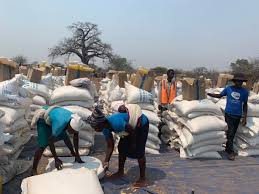Owen Dhliwayo
Chipinge, a picturesque district in Zimbabwe’s Manicaland province boasts a reputation for its lush landscapes and fertile soils, thanks to an average annual rainfall of 1,105 millimeters. The district’s warm climate and ample rainfall create an ideal environment for agriculture, making it a hub for farming activities.
Local farmers capitalize on these favorable conditions, cultivating a diverse range of crops including tea, coffee, avocados, bananas and macademia nuts. The surrounding mountain slopes are blanketed with pine and acacia plantations further enhancing the district’s natural beauty and economic significance.
However, the agricultural haven is facing an unprecedented threat. The El Nino induced drought has cast a shadow over Chipinge’s prosperity, leaving farmers anxious about their livelihoods. The drought’s far reaching impact has resulted in wilting crops, depleted water sources, reduced cattle grazing lands and an increased risk of wildfires in plantations.
The community is in need of conservation measures and innovative farming techniques to mitigate the effects of the drought and other related climate change induced phenomenon. The current El Nino induced drought serves as a stark reminder of the fragility of our environment and the importance of sustainable practices.
Honorable Clifford Hlatywayo, the member of the National Assembly for Chipinge South Constituency asked the Minister of Lands, Agriculture, Fisheries, Water and Rural Development on the status of the plans to construct a dam along Save River. The Deputy Minister, Honorable Haritatos responded that indeed there are plans to construct the dam that will be known as Kondo – Chitohwe Dam and is expected to be twice the size of Tokwe – Mukosi Dam. However, the plan hinges on the securing of a private funder for the project.
“May the Honorable Minister inform the House what plans the Ministry is putting in place to construct a dam along Save River in Chipinge South given that the area is dry and considered region 4 and 5 with high temperatures but good soils.” Honorable Hlatywayo asked
The construction of this dam is expected to support local farmers in their efforts to adapt and thrive and by coming up with a comprehensive plan for the dam, Chipinge agricultural abundance will continue to flourish. Nevertheless, there is a need for wider consultations of key stakeholders to limit the dangers of displacements.


